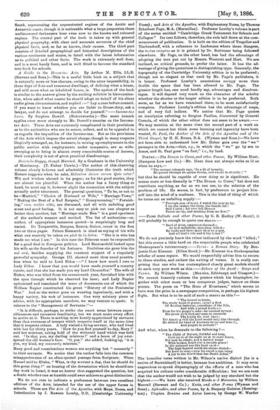How to be Happy, though Married. By a Graduate in
the University of Matrimony. (T. Fisher Unwin.)—The author of this charming volume clearly believes and admirably illustrates the truth which Horace suggests when he asks, Ridentem dicere verum Quis vetat ? Wit and wisdom abound in its pages; as for the good stories, they are almost too plentiful. When the author has a funny thing at hand, he must say it, however slight the connection with the subject actually under treatment. The general questions, "To he, or not to be—Married," "Choice of Husband or Wife," "Marriage-Vows," "Making the Best of a Bad Bargain," "Honeymooning," "Furnish- ing," cum multis aliis, are discussed, and all with unfailing good sense and good feeling. It is not easy to pick out one chapter as better than another, but "Marriage, made Men" is a good specimen of the author's manner and method. The list of authorities—or, rather, of appropriate instances quoted—is surprisingly long and varied. De Tocqueville, Bunyan, Baxter, Guizot, occur in the first two or three pages. Prince Bismarck is cited as saying of his wife what can scarcely be taken an pied de la lettre. "She it is who has made me what I am." In this case the Princess must be responsible for a good deal in European politics. Lord Beacossfield looked upon his wife as the founder of big fortunes. Doubtless she gave him the Ira era, besides supplying the constant support of a singularly powerful sympathy. George III. showed more than usual penetra- tion when he said to Lord Eldon :—" I know how much I owe to Lady Eldon. I know that you would have made yourself a country curate, and that she has made you my Lord Chancellor." The wife of Huber, who was blind from his seventeenth year, furnished him with the eyes through which he observed his bees ; and Lady Napier epitomised and translated the mass of documents out of which Sir William Napier constructed his great "History of the Peninsular War." And so the writer goes on weaving ingeniously, and with a happy variety, his web of instances. One very salutary piece of advice, with its appropriate anecdote, we may venture to quote. It relates to the "Management of Servants :"—
"It is difficult, perhaps, to strike the exact mean between super- ciliousness and excessive familiarity, but we must make every effort to arrive at it. There is nothing more keenly appreciated by servants than that evenness of temper which respects itself at the same time that it respects others. A lady visited a dying servant, who had lived with her for thirty years. 'flow do you find yourself to-day, Mary ?' said her mistress, taking hold of the withered hand which was held out. 'Is that you, my darling mistress ?' and a beam of joy over- spread the old woman's face. ' 0, yes she added, looking up, it is you, my kind, my mannerly mistress."
Many good and conscientious women are anything but " mannerly " to their servants. We notice that the author falls into the common misapprehension of an often-quoted passage from Scripture. When Hazael said to Elisha, "What, is thy servant a dog, that he should do this great thing ?" on hearing of the devastation which he should one day work in Israel, it was no horror that suggested the question, but a doubt whether one so humble could ever achieve so great distinction.
We do not care to indicate a preference between two excellent editions of the Acts, intended for the use of the upper forms in aohools. These are The Acts of the Apostles, with Maps, Notes, and Introduction by J. Rawson Lumby, D.D. (Cambridge University
Press) ; and Acts of the Apostles, with Explanatory Notes, by Thomaa
Ethelbert Page, M.A. (Macmillan). Professor Lumby's volume is part of the series entitled "Cambridge Greek Testament for Schools and Colleges." Its text follows, therefore, the rule laid down at the com- mencement of publication. It is built OD the edition of Tregelles and Tischendorff, with a reference to Lachmann where these disagree, the textus receptus as it is printed by Dr. Scrivener being followed elsewhere. Mr. Page, on the other hand, has had the advantage of adopting the text pat out by Messrs. Westcott and fort. We aro inclined, on critical grounds, to prefer the latter. It has the ad- vantage of giving the quotations in distinguishing type. Generally, the topography of the Cambridge University edition is to be preferred ; though not so elegant as that used by Mr. Page's publishers, it is larger. Professor Lumby's annotations occupy more than double the space that has been allowed to Mr. Page. The greater length has, one need hardly say, advantages and disadvan- tages. It will depend very mach on the character of the scholar whether the shorter or the longer edition is to be preferred. Both seem, as far as we have examined them, to be most satisfactorily complete. Professor Lumby's edition has the advantage of maps,. and of very full indices. We notice that Mr. Page quotes. an inscription referring to Sergius Paullus, discovered by General Cesnola, of which the other editor does not seem to be aware.— We may mention at the same time the second part of a work on which we cannot but think some learning and ingenuity have been wasted, St. Paul, the Author of the Acts of the Apostles and of the Third Gospel, by H. H. Evans, B.A.. (Wyman and Sons.)—We have not been able to understand how Mr. Heber gets over the "we 'r passages in the Acts,—that, e.g., in which the "we" go by sea to, Asses, and St. Pan] goes "on foot," i.e., by land.














































 Previous page
Previous page